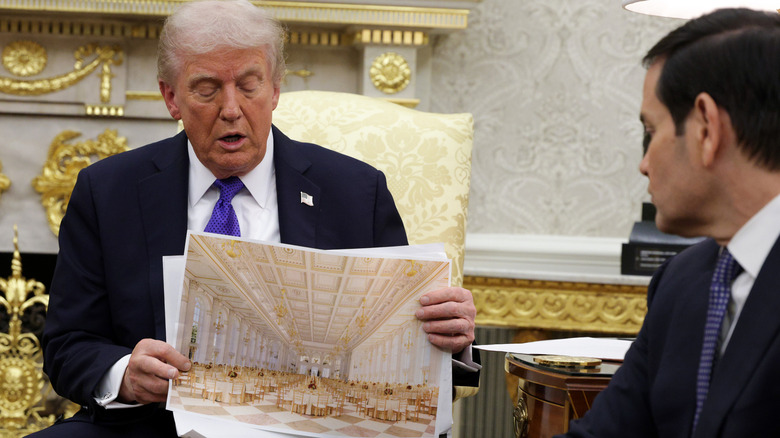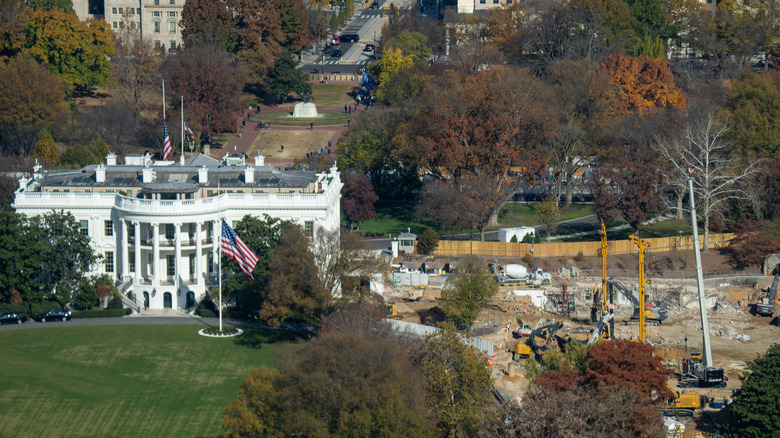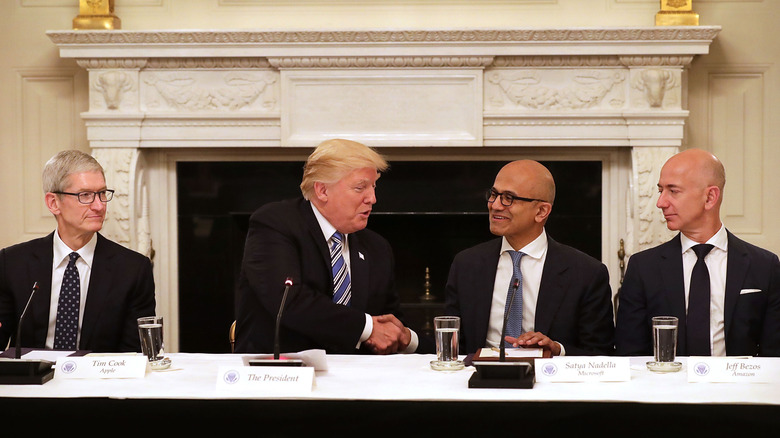The New Bill That Would Target White House Ballroom Donations
Senator Elizabeth Warren, D-Massachusetts, and Representative Robert Garcia, D-California, have introduced a bill that seeks to curtail undue influence in the federal government by those who donated money for the construction of President Donald Trump's new $300 million, 90,000-square-foot ballroom at the White House.
If passed, the Stop Ballroom Bribery Act (via Elizabeth Warren's press release) would require future donations for the ballroom's construction, other White House renovations, and enhancements at various federal-owned properties used by the president and vice president to be screened by Senate-confirmed directors of the National Park Service (NPS) and the Office of Government Ethics. Those donations would also be subject to restrictions. For example, donations from entities and individuals that present a conflict of interest would be banned, while the president, vice president, and their respective families and staff would be prohibited from soliciting donations. It would also be illegal for donations to be coerced or conditioned on the receipt of benefits from the federal government.
Regarding the donations already received, the act would prohibit donors' names and logos from being displayed at the White House or at other federal properties used by the president and vice president, impose a two-year ban on the donors lobbying the federal government, and block remaining funds from being used for personal benefit. If the bill passes, the names of those who gave, and how much they gave, would also have to be published by the NPS.
Ballroom donors include three influential lobbyists with ties to Trump
At least 26 corporate donors have either been disclosed by the White House or revealed by news reports, according to nonprofit consumer advocacy group Public Citizen. Of those 26, 17 are represented by three lobbying firms affiliated with Brian Ballard, who used to lobby for Trump's businesses prior to his presidency; Reince Priebus, Trump's chief of staff during part of his first term; and Jeff Miller, a Republican party fundraiser who served as a finance co-chair for Trump's second inauguration.
The three men's firms routinely lobby the federal government on items as wide ranging as tobacco and crypto, Public Citizen reported. In addition, in the past five years, most of the ballroom donors have been involved in federal contracts totaling $279 billion. The majority of them were either under federal enforcement actions or had such actions suspended by the Trump administration.
For his part, President Trump said the new ballroom, which will replace the East Wing he demolished, is needed to hold more guests at official dinners, per CBS News. Citing the need for space, the president noted that people had to be turned away from an event for Saudi Crown Prince Mohammad bin Salman (to whose country Trump wants to sell F-35 fighter jets).
Some donors say they gave due to corporate civic pride
Senator Richard Blumenthal of Connecticut, a co-sponsor of the Stop Ballroom Bribery Act, sent letters to 40 individuals and entities that back the ballroom project, CBS News reported. Just 16 replied, including Amazon, Apple, Booz Allen, Coinbase, Comcast, Google, HP, Meta, Micron Technology, Microsoft, Nvidia, and T-Mobile. None disclosed how much they gave. Most said corporate civic pride was the reason behind their donations, though Amazon and Microsoft said they gave after being contacted by fundraisers, per CBS.
Emilie Choi, president and COO of Coinbase (a crypto exchange that's being sued by investors and the state of Oregon) gave a little more detail on why her company donated with a one word answer during an Axios BDF event. Asked by Axios if Coinbase's donation was meant to "keep good relations with the White House", she replied "sure." Coinbase did benefit from the Trump administration dropping a civil action by the Securities Exchange Commission in February 2025. And Amazon may have benefited as well, when the Federal Trade Commission under Trump made a $2.5 billion settlement over alleged deceptive Amazon Prime subscription tactics.
Blumenthal said the Stop Ballroom Bribery Act is a "direct response to Trump's ballroom boondoggle," adding that the legislation aims to prevent Trump and subsequent presidents "from using construction projects as vehicles for corruption and personal vanity." So far, the co-sponsors of the bill are all Democrats. Both houses have a Republican majority, making passage this year doubtful.


